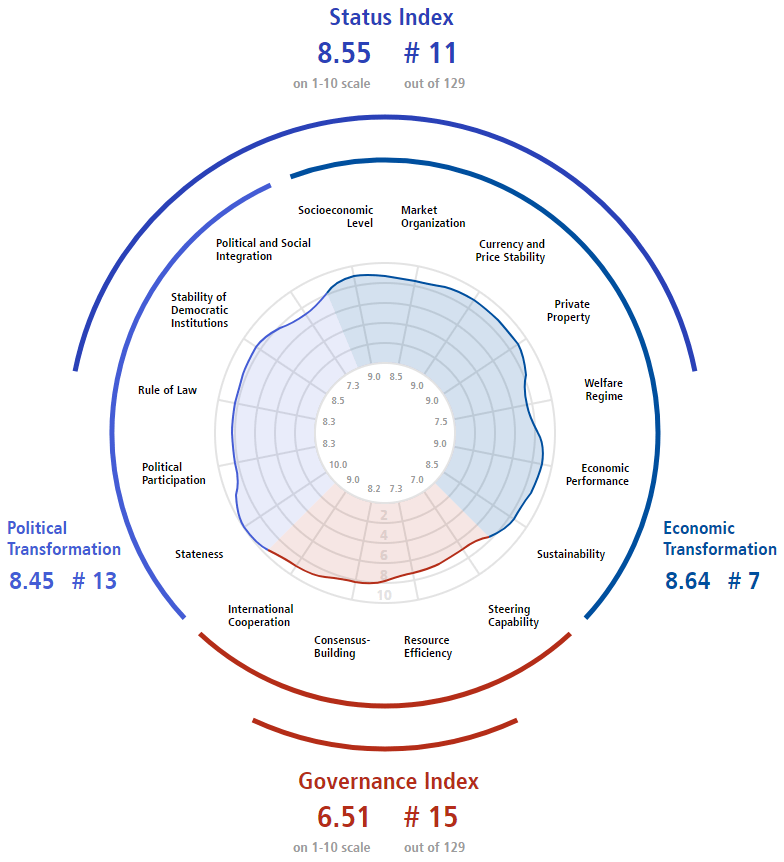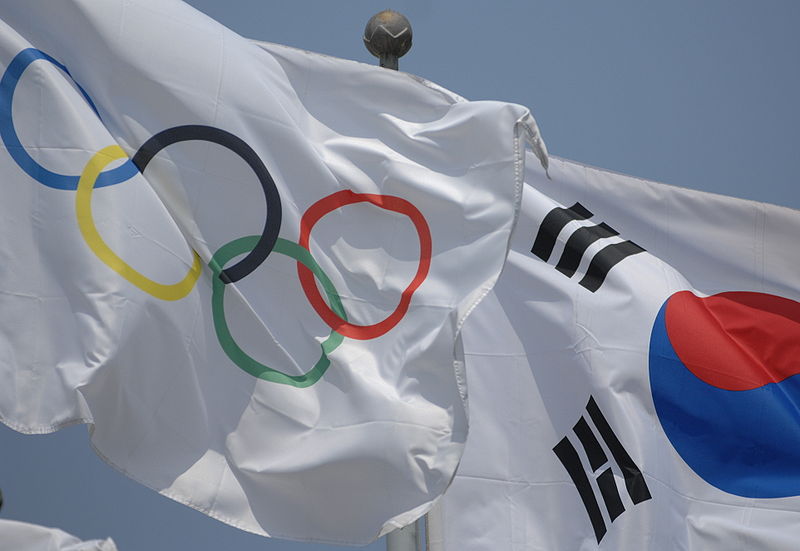Peaceful Olympics amid Thawing Tensions
On 9 February the Pyeongchang Olympics will be opened. This means that South Korea will be the first country examined by the Bertelsmann Transformation Index (BTI) to host both summer and winter games. We fact-check the 2018 Olympics through the looking glass of selected criteria and indicators of our index, which will be published in March.
Criterion 2 – Political participation (8.3 out of 10 points): Right on time for the Olympic Games, South Korea’s democracy presents itself in the best light. This worked wonderfully once before in the run-up to Seoul 1988. The internal and external pressure before the upcoming 1988 Seoul Olympics forced the ruling generals to hold the first free and fair elections in 1987. Certainly, not only the Olympic idea has contributed to this. To be sure, skillful political management of opposition leaders, political failure of the ruling elite and external constraints by the US government have also played a certain role. And today? Despite certain reservations about freedom of assembly, expression and the press, South Korea’s democracy is one of the most participatory in Asia.
Criterion 3 – Rule of law (8.3 points): Even before the first medals were awarded in Pyeongchang, South Korea’s democracy had a clear victory. The separation of powers has been put to the test in the last year and a half – and has proven to be resilient: Parliament and the Constitutional Court dismissed corrupt President Park Geun-hye last year. After the games in an environment of rule of injustice – Sochi 2014 – and of a deepening swamp of corruption – Rio 2016 – games are finally taking place again in a state that deserves to be characterized as governed by the rule of law.
Unification of Korea’s ice hockey team
Indicator 5.4 – Social capital (7 points): A dynamic civil society played a significant part in ending Park’s rule early. South Koreans put pressure on the highest judges with weekly mass protests at the end of 2016 (2.3 million people took to the streets against Park on 3 December 2016 alone). Civil society is made up of formal and informal networks of religious, educational, university or regional character. Outside of these closed networks, Koreans trust each other much less. The World Values Survey 2015 found out that South Korea is worse off than neighboring countries China, Japan and Taiwan in terms of interpersonal trust. Only just over a quarter of respondents said that “most people can be trusted. The women’s ice hockey team is expected to have a particularly great deal of courage to build trust: Because President Moon Jae-in seized the rhetorical olive branch of the North Korean dictator Kim Jong-un, South Korea’s close-knit team had to quickly integrate North Koreans who did not qualify for the Olympics the usual way. The united Korean team will play its first match against Switzerland on 10 February at 9:10 p.m. Korean time. The new teammates will play under the “unification flag”, and the neutral traditional Korean folk song “Arirang” will be played as national anthem.
Criterion 10 – Welfare regime (7.5 points): The 32 athletes from North Korea will not only get to know a rich neighboring country on their first visit to the South, but may also get an impression of a sufficiently functioning social security system. In recent decades, South Korea has progressively expanded its state programs for illness, pensions, accidents and unemployment. The formerly communist North, on the other hand, has, after the collapse of the state-run allocation system in the 1990s, developed into an informal capitalist society in which only people with a favorable caste (songbun) or (often illegally earned) money have access to urgently needed goods.

Indicator 11.1 – Output strength (9 points): Olympic athletes and visitors will enjoy an excellent infrastructure and modern sports facilities. The economic backbone of the eleventh largest economy is robust. Since the first BTI publication in 2004, the Koreans have overtaken Australia, Mexico, Russia and Spain in terms of economic strength (measured by gross domestic product). The per capita income of South Koreans has long been above the EU average. No wonder that many emerging economies are eager to learn from the record-breaking rise from a low-income to high-income country.
Institutions fight corruption more efficiently
Criterion 12 – Sustainability (8.5 points): Thanks to many years of national campaigns, the once ubiquitous garbage and dirt has largely disappeared from the street scene. Emissions of air pollutants such as sulphur oxides have been reduced in line with international climate agreements and the water quality and recycling of waste has improved, although even more effort would be needed. The subway and local bus system in the Seoul metropolitan area is one of the most efficient and at the same time cheapest in the world. However, Koreans still have a tendency to waste on large-scale projects. The newly built stadium in Pyeongchang will be demolished immediately after the Olympic and Paralympic Games.
Criterion 14 – Steering capability (7.0 points): If you think efficient command structures and democracy can’t go hand in hand, you should take a closer look at South Korea. Leaders are traditionally endowed with a tremendous power and their subordinates follow them uncritically up to a certain point. The result in the case of the Olympics: the sports facilities and the Olympic village were completed as early as in December. However, if leaders squander their confidence and respect, Koreans can quickly drive them out of office, regardless of whether they are president or head of the largest conglomerate. (Spoiler: After almost a year behind bars, Samsung’s de facto head Lee Jae-yong walked free at the beginning of this week, after an appeals court surprisingly cut his sentence for involvement in a government corruption scandal – to the annoyance of many Koreans who see the old favoritism between family-run corporations and the justice system at work).
Criterion 15 – Resource efficiency (7.7 points): With the exception of the 1984 Los Angeles Summer Games, which produced a surplus, the Olympic flame burns huge amounts of money every two years. South Korea will be no exception. However, the current estimated cost of 13 billion dollars for the games is well below that of Rio 2016 (20 billion dollars), Sochi 2014 (51 billion dollars) and London 2012 (18 billion dollars). The South Korean public sector is generally considered one of the most efficient. Only 5.7% of the workforce (as of 2008, figure rising) are employed by the government and public enterprises, the lowest share of all OECD countries. Policy coordination is considered to be particularly effective because of the relatively centralized structure of the state, whose power is concentrated on the government and in particular on the presidency. But it is also susceptible to corruption. However, the institutions for combating corruption have improved considerably. A milestone is the “Kim-Young-ran Law”, enacted in March 2015, named after an incorruptible power woman in the male-dominated judicial system. Among other things, the law prevents officials, journalists and teachers from paying for a meal worth more than 30,000 Korean won (about 23 euros) if there is a potential conflict of interest.
How sustainable is rapprochement between the two Koreas?
Indicator 16.5 – Reconciliation (7 points): Low temperatures of minus 15 degrees Celsius and icy Siberian winds are expected for Pyeongchang 2018. This meteorological forecast contrasts with the unexpected thaw between the two hostile polities of the country, which is supposed to warm the hearts of Koreans and the wider world. The extent to which North Korea’s behavior has changed is illustrated by a historical comparison: before the 1988 Summer Games in Seoul, North Korea really did everything possible to disrupt peace. Kim Il-sung’s agents even placed a bomb on board Korean Airline flight 858 in November 1987, killing 115 people. Now, 30 years later, Kim Il-sung’s grandson Jong-un sends not only athletes, but also his sister to Pyeongchang. So nothing stands in the way of peaceful games. Nevertheless, it is quite likely that the current course of reconciliation between the two Koreas is rather short-term than sustainable and that the reservoir of political common ground, for example on the nuclear issue, will be exhausted soon after the Olympics.
Criterion 17 – International cooperation (9.0 points): For the first time, athletes from more than 90 countries will participate in Olympic winter games. Even politically speaking, South Korea has long found its place in the international community. It has diplomatic relations with 190 states. Qualitatively, however, relations with the most important partners remain ambivalent. For historical reasons, a large part of the population is very critical of the two major military allies because of the Japanese colonization and war crimes in the first half of the 20th century and the US role on the peninsula which many perceive as too dominant. The largest trading partner China, whose political-strategic interest in North Korea’s continued existence collides with Seoul’s raison d’état, occasionally flexes its muscles, for example in the government-imposed boycott of South Korean products in response to the stationing of an American missile defense system on the peninsula. South Korea has so far performed very well in this difficult international environment. From the BTI’s development and transformation policy perspective, it is particularly noteworthy that South Korea was the first country ever to evolve from a recipient to a donor country within the OECD Development Assistance Committee. Let the games begin!
Robert Schwarz is project manager of the Bertelsmann Transformation Index (BTI). Before joining the Bertelsmann Stiftung, he studied, researched and lived in the Seoul metropolitan area from 2007 to 2011.


Thanks for the information and very useful 🙂